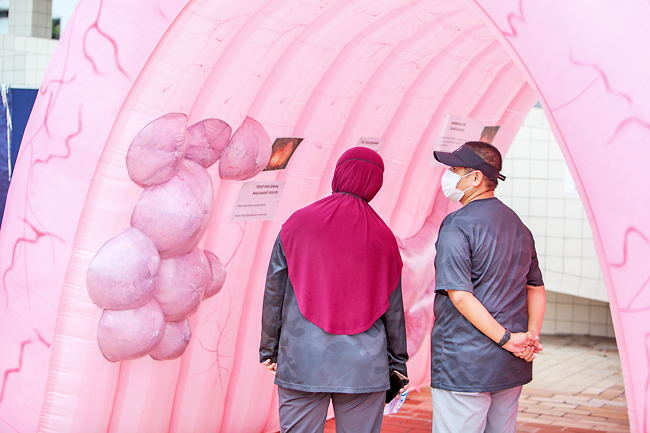Adib Noor
Colorectal cancer, more commonly known as colon cancer is the number one cancer diagnosed in men in Brunei Darussalam in 2020.
It is the second highest for women in the country, said medical officer Dr Siti Zuhrini binti Haji Kahan, who is with the Noncommunicable Disease Prevention Unit at the Ministry of Health (MoH).
“About 70 per cent of these cases were diagnosed at Stage 2 and above,” she added.
Early detection is important when it comes to successfully combatting all forms of cancer.
However, due to the COVID-19 pandemic, all cancer screenings during the last two years were interrupted, said Dr Siti Zuhrini. She said screenings resumed this year.
For colon cancer, she said, a health screening can detect cancer cells before patients show any symptoms. If detected at an early stage, there is a higher chance of successful treatment.
“It also decreases the chance of complications or death as result of the cancer,” said the health officer.


Dr Siti Zuhirini said the Sultanate offers four types of screening under the National Health Programme (NHSP) as part of the MoH initiatives to detect and prevent noncommunicable diseases such as high blood pressure, diabetes mellitus, high cholesterol and cancer, and hence to allow for early and effective management of the diseases.
The programme offers screening for cardiovascular risk factors as well as screening for breast, cervical or colon cancers.
Colon cancer screening is open to individuals aged 50-75 years that do not have no prior history of the disease.
Those wishing to be tested must not have undergone a stool test in the last two years or a colonoscopy in the last 10 years.
The screening involves the participant’s stool to be sent to the lab to check for the presence of blood using a test called Faecal Immunochemical Test or FIT.
“If the test result is positive, it means that blood has been detected in their stool, and they will be referred to a doctor for further investigation,” she explained.
“However, having a positive FIT result does not mean that they have cancer, because there are other reasons why blood is detected in stools. Further investigation will be done through a colonoscopy.
“Meanwhile, if their FIT result is negative, they will be invited to be screened again every two years,” she said.
Registering for the screening can be done at the reception counter at all Health Centres in the country.
Forms are available at the reception desks, and can also be downloaded at the official website www.ppkk.gov.bn.







